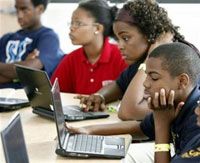美費(fèi)城新理念“未來(lái)中學(xué)”開(kāi)學(xué)
[ 2006-09-11 08:50 ]
|
 |
| Students work on their laptops on the first day
of school at the 'School of the Future' in Philadelphia, September
7, 2006. |
Philadelphia on Thursday opened a public high school
where students work on wireless laptops, teachers eschew traditional
subjects for real-world topics and parents can track their child's work on
the Internet.
Called "The School of the Future" and created with help from software
giant Microsoft, it is believed to be the first in the world to combine
innovative teaching methods with the latest technology.
The school, which cost the school
district $63 million to build, is free and has no entrance
exams. The 170 students in the inaugural ninth-grade class were selected
by lottery from 1,500 applicants.
Three-quarters of the students come from the surrounding West
Philadelphia neighborhood; 95 percent of the students are black, and about
85 percent come from low-income
households , the school district said.
Philadelphia School District Chief Executive Paul Vallas told students
they would be scrutinized by other schools around the world.
"You have become instant role models," Vallas said. "People are going
to be ... watching you."
Student still sit in classrooms, but lessons rely heavily on
information found on the Internet. Students will be allowed to learn at
their own pace. Homework is done on computer and sent to the teacher for
grading and parents can access the school's network to read teacher
feedback on their child's progress.
Traditional education is obsolete and fails to teach students the
skills of problem-solving, critical thinking and effective communication,
which they need to succeed in the 21st century, principal Shirley Grover
said in an interview.
David Terry, 14, said he was hoping to "turn over a new leaf" after
discipline problems in his previous school left him with an "average to
really bad" academic record.
"This is a great opportunity for me," he said. "In other schools, I
would not get this kind of
education."
(Agencies) |
上周四,美國(guó)費(fèi)城一所新型公立中學(xué)正式開(kāi)學(xué)。在這里,學(xué)生們使用無(wú)線(xiàn)筆記本電腦學(xué)習(xí),老師們的授課內(nèi)容不再是傳統(tǒng)課程,而是現(xiàn)實(shí)世界中的話(huà)題,家長(zhǎng)可以通過(guò)互聯(lián)網(wǎng)隨時(shí)了解孩子的學(xué)習(xí)情況。
這所名叫“未來(lái)中學(xué)”的學(xué)校由軟件巨頭“微軟公司”協(xié)助建成,是全球第一所將新興教學(xué)方法與先進(jìn)科技相結(jié)合的學(xué)校。
費(fèi)城學(xué)區(qū)為該校的建設(shè)共投入6300萬(wàn)美元,學(xué)校免收學(xué)費(fèi),而且沒(méi)有入學(xué)考試。目前該學(xué)校九年級(jí)(最低年級(jí))招收的170名學(xué)生都是從1500名候選人中隨機(jī)挑選出來(lái)的。
據(jù)費(fèi)城學(xué)區(qū)介紹,有四分之三的學(xué)生家住費(fèi)城西區(qū)附近;95%的學(xué)生是黑人,85%的學(xué)生來(lái)自低收入家庭。
費(fèi)城學(xué)區(qū)區(qū)長(zhǎng)保爾·瓦拉斯告訴未來(lái)中學(xué)的學(xué)生,他們的表現(xiàn)將受到世界上其他學(xué)校的關(guān)注。
瓦拉斯說(shuō):“現(xiàn)在你們都是榜樣,人們將會(huì)很關(guān)注你們的學(xué)習(xí)情況。”
在未來(lái)中學(xué),雖然學(xué)生們還是坐在教室里學(xué)習(xí),但是上課的內(nèi)容主要來(lái)源于網(wǎng)上信息。學(xué)生們可以自行掌握學(xué)習(xí)進(jìn)度。他們?cè)陔娔X上完成家庭作業(yè),然后發(fā)給老師批改評(píng)分,家長(zhǎng)們可以進(jìn)入學(xué)校網(wǎng)絡(luò)查看老師的評(píng)語(yǔ)。
校長(zhǎng)舍莉·格羅弗在一次采訪(fǎng)中說(shuō),如今傳統(tǒng)教育已經(jīng)過(guò)時(shí)了,無(wú)法提高學(xué)生解決問(wèn)題、辨證思考和有效溝通的能力,而這些能力正是21世紀(jì)所需要的。
14歲的大衛(wèi)·特里說(shuō),他希望自己能在這所學(xué)校“翻開(kāi)新的一頁(yè)”,他在過(guò)去那所學(xué)校因?yàn)閷W(xué)科問(wèn)題,學(xué)習(xí)成績(jī)被評(píng)定為“很差”。
他說(shuō):“這所學(xué)校對(duì)于我來(lái)說(shuō)是個(gè)很好的機(jī)會(huì)。在其它學(xué)校,我無(wú)法受到這種類(lèi)型的教育。”
(英語(yǔ)點(diǎn)津姍姍編輯)
|
|
|
Vocabulary:
|
|
school
district : 學(xué)區(qū)(美國(guó)的“學(xué)區(qū)”又稱(chēng)“地方學(xué)區(qū)”(Local School
District),是州政府最基層的教育行政機(jī)關(guān)。學(xué)區(qū)作為一級(jí)行政機(jī)關(guān),直接管理學(xué)區(qū)所有學(xué)校,具有較大的自主權(quán)。它的權(quán)力機(jī)關(guān)是學(xué)區(qū)“教育委員會(huì)”。)
low-income household : 低收入家庭
|
|
|
|